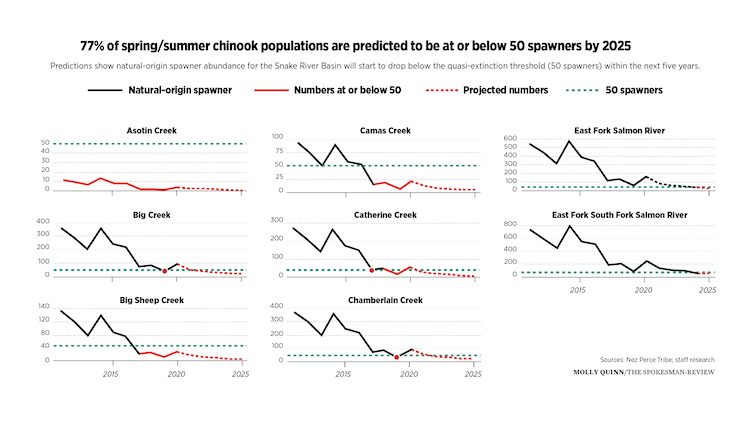forum
library
tutorial
contact

Idaho Public Television Program to Examine Controversy
Surrounding Breaching of Lower Snake River Dams
by Staff
Big Country News, October 13, 2021
|
the film forum library tutorial contact |

|
Idaho Public Television Program to Examine Controversy
by Staff
|
 LEWISTON -- Congressman Mike Simpson unleashed a storm of controversy by calling for the breaching of the four lower Snake River dams, all located in the state of Washington. His proposal says it would compensate all those impacted by the loss of the dams, to the tune of $33.5 billion.
LEWISTON -- Congressman Mike Simpson unleashed a storm of controversy by calling for the breaching of the four lower Snake River dams, all located in the state of Washington. His proposal says it would compensate all those impacted by the loss of the dams, to the tune of $33.5 billion.
"That's a bold proposal for someone from one of the reddest Congressional districts in the nation," says Outdoor Idaho host Bruce Reichert. "We decided to examine his comprehensive proposal in the first show of our 39th season." Trying to tell this story in a way that makes sense has meant a lot of travel and a lot of interviews this past summer by producers Aaron Kunz, Forrest Burger and Bruce Reichert. The result can be seen in the upcoming Outdoor Idaho episode, Salmon Reckoning.
Breaching the four dams would seriously affect the "seaport" of Lewiston and the barging of Palouse wheat. The Northwest would lose on average about 1,000 megawatts of clean power. Simpson believes there are ways around these big problems, but that the Northwest has to accept change.
"Change is coming," says the twelve--term congressman from eastern Idaho. "Are we going to take advantage of it? Are we going to design our future, or are we going to have it imposed on us? I think we can do a better job designing it ourselves. I think we can save salmon." Simpson's district encompasses the Sawtooth Valley, where salmon breed and die after spending several years in the Pacific Ocean. "To me, the science is clear. You've got to remove the dams."
Seattle Times newspaper reporter Lynda Mapes has covered the salmon debate for three decades, but she was surprised when Congressman Simpson got involved. "All of a sudden onto the scene comes somebody named Mike Simpson. I had to keep looking up his name. Who is he? Republican out of Idaho. Whoever would have thunk it!"
Mapes has talked with irrigators and others who rely upon the Snake River and see that change is on the horizon. "They would rather shape that change themselves through the Simpson proposal, or something like it. A Northwest decision by northwesterners, rather than something imposed from a courtroom."
Opponents of Simpson's far--reaching proposal argue breaching the four Snake River dams would be devastating to Palouse wheat farmers. "The Snake River system is integral to the economy of north central Idaho. This is our highway to international markets," argues David Doeringsfeld, manager of the Port of Lewiston. "If we lost that river system, it would dramatically change what we grow in this area." Doeringsfeld says barging is the most cost--effective way to get soft white wheat to places like Portland.
The four dams also provide a clean source of energy. "It's a big deal. For us, hydro is over 80 percent of our power supply; the Snake River dams provide 10 percent of that," explains Rick Dunn, manager of Benton PUD in Washington. Both Dunn and Doeringsfeld believe "science" should determine whether the dams are breached.
"There is no surprise to me that these four lower Snake dams are creating the problem they are," says Virgil Moore, former director of Idaho's Fish and Game Department. He has studied the plight of Idaho's salmon for 40 years. "We spent the last 20 years narrowing that uncertainty down to the point where folks like Congressman Simpson can now come out and say there is very little, if any, uncertainty about the fact that we can't get functional recovery with these dams in place."
For many Idaho anglers, like Link Jackson, this is not a difficult decision. "Take the dams out. They're killing the most magnificent run of salmon on the planet. We need to get rid of them, pronto."
"The conditions are so complex," argues retired Idaho lawmaker Steve Hartgen. "Changing currents, weather patterns, climate change. Salmon were here before we got here, but that doesn't mean they have to stay here. So were dodo birds."
Federal courts give the Northwest tribes a major voice in what happens next, and the tribes aren't walking away from this fight. "Without the salmon, it's a pretty lonely world," says Hemene James of the Coeur d'Alene Tribe.
One of the earliest advocates for breaching the four Snake River dams is long--time salmon advocate Ed Chaney, who bluntly says, "The salmon have run out of time. The extinction train is still rolling down the tracks. And if we don't do something, it's over. Those dams don't even pay for their own maintenance. They're zombie money--losing dams."
"This is certainly one of our most controversial programs ever," says Outdoor Idaho host and producer Bruce Reichert. "As we say in our show, Idaho's star will shine more brightly if these fish can continue to return to central Idaho, just like they've done for thousands of years."
Salmon Reckoning on Outdoor Idaho airs Thursday, Oct. 14, at 8 p.m. and again on Sunday, Oct. 17, at 7 p.m. on Idaho Public Television. IdahoPTV Passport members can stream it early beginning Thursday, Oct. 7.
learn more on topics covered in the film
see the video
read the script
learn the songs
discussion forum
